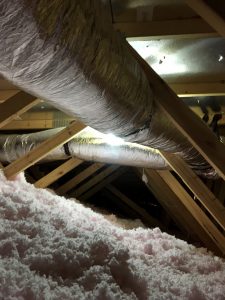 Centralized heating and air conditioning systems rely on a series of ducts to carry cool air to the various corners of your home. They do the same job in the winter when it comes to hot air from your furnace. They do their jobs well in most cases, and because they’re usually hidden behind the walls or in the attic, they don’t often suffer damage. When they do, however – or even when age and wear-and-tear create leaks or breaches – then it can be very hard to spot the damage.
Centralized heating and air conditioning systems rely on a series of ducts to carry cool air to the various corners of your home. They do the same job in the winter when it comes to hot air from your furnace. They do their jobs well in most cases, and because they’re usually hidden behind the walls or in the attic, they don’t often suffer damage. When they do, however – or even when age and wear-and-tear create leaks or breaches – then it can be very hard to spot the damage.
Luckily, there are some common signs of you can spot when a breach or a leak appears in your ducts. When that happens, you can turn off the system and summon a repair technician to deal with the job properly.
Why Are Leaky Ducts a Problem?
The ductwork essentially provides “safe passage” for the cool air in your air conditioner (and the hot air from the heater in the winter time) so that unconditioned air doesn’t waste all of the effort your system made to cool it in the first place. Breaches and leaks slow that process down by either pulling conditioned air out of the ducts or bringing unconditioned air in. Either way, the air isn’t as cool as it needs to be, which means your air conditioner needs to work harder to do its job. Monthly bills will go up and the added strain on other components in your system may result in a breakdown.
Beyond that, they can bring in unwanted components like dust and mold spore from outside the ducts. This is exacerbated by the fact that ducts are often dusty, pulling even more detritus into the breach. It can cause a lot of damage very quickly.
Signs of Trouble
The bad news is that the damage will spread every time you run your air conditioner. The good news is that you can usually spot the signs of trouble very quickly. They can include but are not limited to, the following:
- Strange Noises. Strange noises can include anything from whistles and hums to rattling noises. They will usually be localized at the source of the breach (in the walls or ceiling instead of at the air conditioner itself). They also usually start and stop with the starting and the stopping of the air conditioner.
- Excessive Dust. If the air coming out of your vents – or a single particular vent – is more full of dust than you might expect, that’s usually a good sign that there’s a leak.
- Warmer Air. If unconditioned air gets pulled in through the leak, it will be warmer than it should (or colder if the problem takes place in the winter).
- Lower Airflow. Similarly, if conditioned air gets sucked out of the leak, it will reduce the airflow coming out of the vents.
- Higher Bills. Most of the above conditions will force your air conditioner to work harder to do its job, meaning that your bills might take an unexpected spike.
For quality duct repair in Fort Wayne, IN, call on Collier’s Comfort today!
